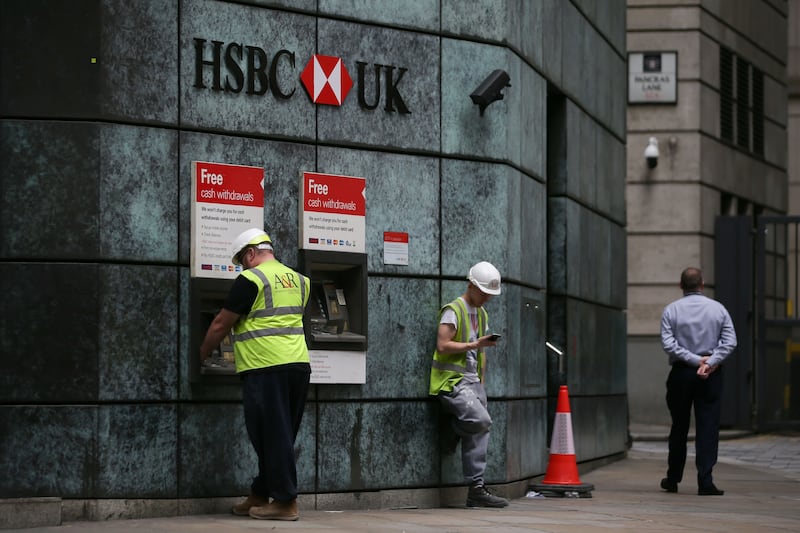HSBC is not plastering Heathrow with its “world’s local bank” tagline anymore, but a Brexit-battered pound and a political swing to the left have spurred internationally minded Brits to snap up its foreign-currency accounts.
Demand for HSBC Currency Accounts (HCAs), which let customers hold cash in foreign currencies in the United Kingdom, spiked 23 per cent in June from the previous month, said the spokesman Ankit Patel. On June 8, the election of the prime minister Theresa May had been expected to win easily resulted in a minority Conservative government after a surprising surge by the Labour Party under Jeremy Corbyn, who has pledged more state intervention and vowed to tax higher earners more heavily. He has since overtaken Mrs May in opinion polls.
"Having seen the calamitous falls you saw immediately post-Brexit, people have woken up to the fact that they have currency risk,” said Rob Burgeman, an investment manager at Brewin Dolphin. As the election loomed, Britons “look and think, we could have prime minister Corbyn here this time next month. It just focused people’s minds on currency risk and political risk: you’re not going to catch us like that again.”
HCAs are offered in 14 currencies, with the vast majority of customers choosing dollars or euros. Year-on-year, the number of new HCAs was 5 per cent higher in the first seven months of 2017, Mr Patel said. The year-earlier period includes June 23, 2016: on that day, Britons shocked pollsters and financial markets by voting to leave the European Union, prompting the pound to plunge to multi-decade lows against the dollar.
_______________
Read more:
Britons spend less and house price growth slows
UK fights rearguard action on EU financial laws before
UK set to 'pay €40 billion' to leave EU
_______________
Unlike the other big UK consumer banks, HSBC operates extensive retail networks abroad, and targets customers with international needs through the HCA and a “global view” product to manage accounts based in other countries. Barclays also offers foreign-currency accounts, but declined to provide figures on recent demand. UK-centric Lloyds said the number of new foreign-currency accounts is little changed.
Fifty-seven per cent of the people who have HCAs are British, HSBC says. Many of the rest were opened by UK-resident foreign nationals, possibly Americans: the bank says there was a surge in demand for accounts around the US presidential election last autumn. The Dollar Index, a measure of the greenback’s strength against other major currencies, rose 7 per cent in the last five months of 2016.
“We see an increase in demand during election periods, because the uncertainty means customers begin to look at the potential impacts on their wealth and how they can minimise this risk,” HSBC said.
More than 80 per cent of HCAs are in dollars or euros. Mr Patel said there was a rush into dollar accounts between August and December 2016. He said the proportion of dollar HCAs jumped to 41 per cent from 35 per cent during that period.
In November, Donald Trump shocked US pundits by taking the presidency, while trailing Hillary Clinton in the popular vote. The US currency soared amid optimism his tax cuts would send cash surging back into the world’s biggest economy.
For people earning pounds, the Trump trade exacerbated the post-Brexit slump in dollar terms. After reaching US$1.50 on optimism for a win by the Remain campaign, the pound bottomed out at $1.18 in October, amid growing concern about a so-called hard Brexit, which would see the UK excluded from the EU’s single market.
_______________
Read more:
UK customs checks seen costing £1 billion
Bank of England likely to cut UK growth forecast
_______________
As Mr Trump’s legislative agenda has stalled, the dollar has weakened recently, with the pound and euro touching 10-month and 30-month highs against the greenback, respectively.
But sterling remains near an eight-year low against the euro as the Brexit talks have begun, trading at about €1.10 per pound versus about €1.30 before the vote. In the weeks after the Brexit vote, HSBC was inundated with requests for HCAs, Bloomberg News reported at the time.
Mr Burgeman said accounts such as HSBC’s are most useful for Britons who have a mortgage on a property outside the country, or are planning on buying a retirement retreat abroad.
“I don’t think people were wildly speculating,” he said.
“It was people who have liabilities, current or future, and want to be able to hedge out some of that.”






